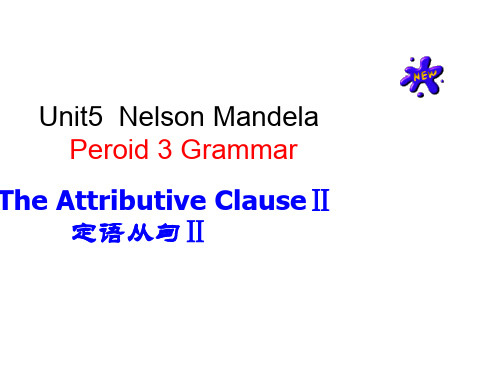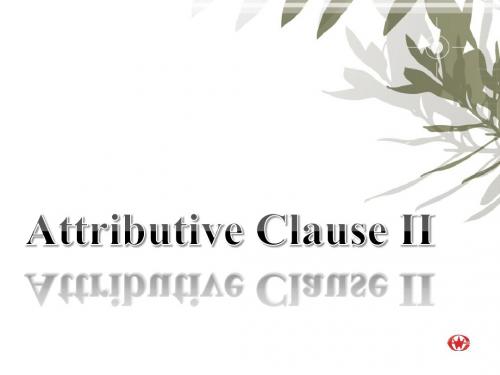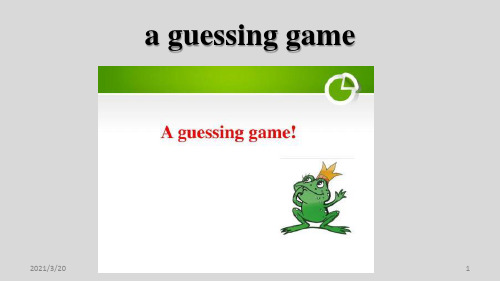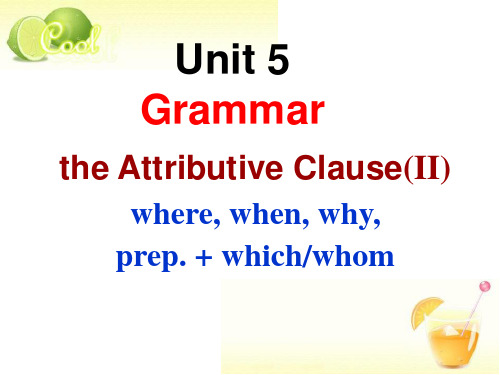人教版高中英语必修一book1unit5grammar(定语从句(二))
- 格式:docx
- 大小:11.09 KB
- 文档页数:2



Section ⅣGrammar —定语从句(Ⅱ)[新知导引]1.(教材P34)The time when I first met Nelson Mandela was a very difficult period of my life.2.(教材P34)It was in 1952 and Mandela was the black lawyer to whom I went for advice.3.(教材P34)He was generous with his time, for which I was grateful.4.(教材P34)The school where I studied for only two years was three kilometres away.5.(教材P34)However, this was a time when one had got to have a passbook to live in Johannesburg.6.(教材P34)... until today we have reached a stage where we have almost no rights at all.7.(教材P34)The places outside the towns where they were sent to live were the poorest parts of South Africa.8.(教材P34)... we were put into a position in which we had either to accept we were less important, or fight the government.[语法详解]定语从句除了由关系代词引导外,还可由关系副词when, where, why引导,它们在从句中作状语。

高中英语必修1 Unit 5语法教学案Section_ⅢGrammar —定语从句(Ⅱ)语法图解【探究发现】1.The time when I first met Nelson Mandela was a very difficult period of my life.2.It was in 1952 and Mandela was the black lawyer to whom I went for advice.3.He was generous with his time, for which I was grateful.4.The school where I studied for only two years was three kilometres away.5.However, this was a time when one had got to have a passbook to live in Johannesburg.6.The day when Nelson Mandela helped me was one of my happiest.7....until today we have reached a stage where we have almost no rights at all.8....we were put into a position in which we had either to accept we were less important, or fight the government.【我的发现】(1) 关系副词when在定语从句中作时间状语(句1、5、6);关系副词where_在定语从句中作地点状语(句4、7)。
(2) 在“介词+which/whom”引导的定语从句中,which用于指代物(句3、8);whom用于指代人(句2)。


第五单元语法突破语法知识精讲Grammar定语从句(Ⅱ)一、关系副词引导的定语从句1.when引导定语从句的用法(1)当先行词是表示时间的名词(如time,day,year,month,week等),且关系词在从句中做时间状语时,定语从句用when引导。
(2)when可以换成“介词+which”。
I still remember the time when(=in which) I was in college.我仍然记得我上大学的那段时光。
I have forgotten the exact date when(=on which) this country became independent.我忘记这个国家独立的确切日期了。
特别提醒当先行词是表示时间的名词时,既可以用when引导定语从句,也可以用that或which引导定语从句,关键要看关系词在定语从句中做何种成分。
若关系词在定语从句中充当状语,则用when引导;若关系词在定语从句中充当主语或宾语,则用that或which引导。
Do you remember the days that/which we spent together on the farm?你记得我们一起在农场度过的那些日子吗?(that或which做spent的宾语)Do you remember the days when we chatted with each other all night?你记得我们整夜聊天的那些日子吗?(when在从句中做状语)2.where引导定语从句的用法(1)当先行词是表示地点的名词(如place,room,mountain,airport等),且关系词在从句中做地点状语时,定语从句用where引导。
(2)where可以换成“介词+which”。
This is the hotel where(=in which) they stayed.这就是他们住过的旅馆。
GRAMMAR
定语从句(二)
定语从句除了用that, which, who, whom, whose等关系代词引导外,还可以用when, where, why等关系副词以及“介词+ which / whom”引导。
【语境展示】观察下面句子,并试着归纳关系副词以及“介词+ which / whom”引导定语从句时的用法。
1. I will never forget the day when / on which we first met.
2. We visited the house where / in which the famous scientist once lived.
3. The reason why / for which John changed his mind is not clear.
4. I finished reading the book in which the 13-year-old boy described his life.
5. The teacher from whom I learnt most was Mrs. Brown.
6. The thing about which Mr. Johnson was not too sure was the young man’s honesty.
【自我归纳】
★关系副词引导定语从句
先行词表时间,关系词在从句中作时间状语时,从句用关系副词________ 引导(句1);先行词表地点,关系词在从句中作地点状语时,从句用关系副词where引导(句2);先行词表________(只有reason一词),关系词在从句中作原因状语时,从句用关系副词why引导(句3)。
关系副词when,where,why在意义上都相当于一个“介词+ which”结构(句1—句3)。
★介词+ which / whom引导定语从句
在“介词+ which / whom”引导的定语从句中,which用于指代物(句1、句2、句3、句4、句6),whom用于指代人(句5)。
“介词+ which / whom”结构中介词的选择一般取决于习惯搭配或主从句的意义(句1—句6)。
注意:在定语从句中,含有介词的短语动词一般不拆开,介词仍放在动词的后面。
如:Is this the knife (which / that) you are looking for?
The child (whom / that) the nurses are looking after is very well now.
【即学即练】
I. 将下面两个句子合成一个含有定语从句的复合句。
1. I remember one summer. The whole family went to the lake then.
________________________________________
2. There are a few students. I can’t remember their names.
________________________________________
3. The bookstore is having a sale this week. I bought my books from it.
________________________________________
4. I have never heard of the singer. My son talks about her.
________________________________________
5. Emily and I shared a room. We spent nights talking there.
________________________________________
II. 用适当的关系副词或“介词+ which / whom”填空。
1. We’d like to know the reason ________ she didn’t accept the job.
2. This was at a time ________ there was no radio, TV or cinema.
3. The hotel ________ we stayed was both cheap and comfortable.
4. Carl is the man ________ you can depend.
5. This is the dictionary ________ I paid 5 dollars.
6. That wasn’t the reason ________ your brother lied to you.
7. We all remember the days ________ we studied together at school.
8. The pen ________ I do my homework is a birthday present from my father.
9. This is the street ________ Jack parks his car.
III. 用适当的关系词补全下面短文。
Children are always happy on the day 1. ________ summer vacation begins. They think about the plans 2. ________ they have for the summer. Some children go to a day camp 3. ________is near their home. At the end of the day, they can go home. Other kids choose to go to a camp in the country 4. ________ they are instructed by camp counselors. These counselors are often college students 5. ________ are trying to earn a little extra money during their summer
vacation. Some kids go to specialized (专业的) camps. There they can improve a particular skill
or learn a new hobby 6. ________they are interested in. This is the reason 7. ________ specialized camps are popular with both parents and kids. There are some kids 8. ________ parents take them on a trip in a car. They often visit state and national parks.
参考答案
【自我归纳】 when;原因
【即学即练】
I.
1. I remember one summer when / in which the whole family went to the lake.
2. There are a few students whose names I can’t remember.
3. The bookstore where / from which I bought my books is having a sale this week.
4. I have never heard of the singer about whom my son talks.
5. Emily and I shared a room where / in which we spent nights talking.
II. 1. why / for which 2. when / at which 3. where / at which / in which
4. on whom / upon whom
5. for which
6. why / for which
7. when / during which
8. with which
9. where / in which
III.
1. when
2. that / which
3. which / that
4. where
5. who / that
6. which / that
7. why 8. whose。